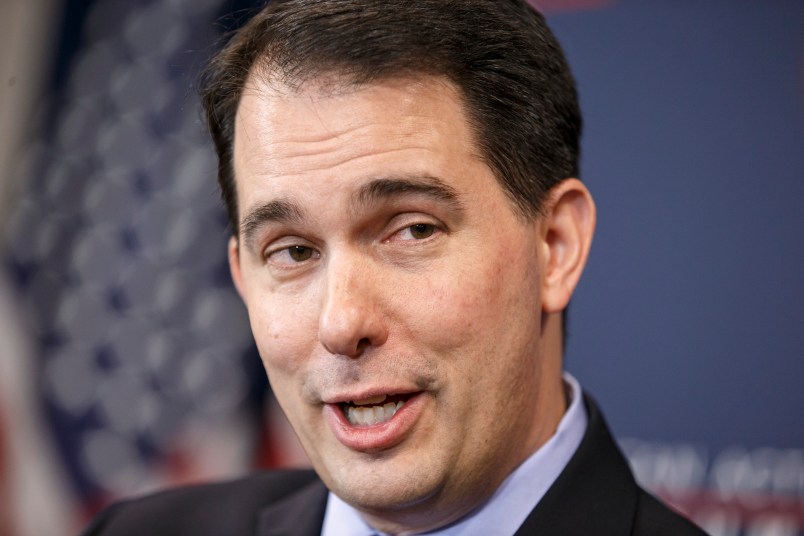Wisconsin Gov. Scott Walker’s (R) new state budget is tailor made to do two things: endear him to conservatives and enrage liberals, both in and out of Wisconsin. The budget is widely perceived in Wisconsin as an opening salvo in Walker’s 2016 campaign for the Republican presidential nomination, a way to solidify his bona fides with the conservative primary base.
The proposal, which Walker unveiled earlier this month, has gotten plenty of national attention just for Walker’s proposal to drastically change the mission statement of the University of Wisconsin system, which is something of a cherished moniker in the state.
But the Walker budget hits a number of other hot buttons, too. It slashes public broadcasting funding in the state, cuts $300 million from the University of Wisconsin system, shrinks the secretary of state’s office (which battled Walker over his push to roll back collective bargaining rights), proposes drug testing for recipients of food stamps, Medicaid, and jobless benefits, and makes major changes to the state’s judicial branch (including targeting the liberal chief justice of the Supreme Court with a pay cut).
“I think everybody believes it’s tied to the presidential campaign,” University of Wisconsin political scientist Barry Burden told TPM. “That this is a way to demonstrate to conservative activists who will be very involved in the Iowa caucuses … pretty dramatic success in scaling back the scope of state government here and in lowering taxes. It’s not just that the government is going to grow at a slower rate than it had been or that it’s going to grow slower than inflation, in at least one of the years in the next budget, there’s actually a reduction in the total spending of the state. So it’s a pretty dramatic budget.”
The new budget lets Walker run on the claim that he’s a serious spending hawk who fought not only unions and won, but also cut spending in all kinds of corners of Wisconsin including education, public broadcasting, and staffing of government offices that happen to have sometimes been a thorn in Walker’s paw.
Walker’s budget proposes changing how courts are funded. The Milwaukee Journal-Sentinel reported that his proposal includes a provision that effectively eliminates Wisconsin’s Judicial Commission, which investigates judicial misconduct claims. Instead, the commission would be put under direct control of the Supreme Court, which would have enhanced powers on fiscal matters via Walker.
Walker’s proposal also includes a provision cutting the salary of Wisconsin State Supreme Court Justice Shirley Abrahamson from about $155,400 to $147,400, the same as the other justices. Abrahamson happens to be one of the two remaining “staunchly liberal” justices on the Wisconsin Supreme Court, according to Wisconsin’s Capital Times. The chief justice has more duties than her colleagues so in the past has gotten a higher salary.
Walker’s budget proposes cutting funding to Secretary of State Doug La Follette’s (D) budget and staff. La Folette recently wrote a letter to Walker saying that those cuts would be devastating to his office.
Walker has gotten the most negative attention so for his budget proposal’s changes to the University of Wisconsin. His proposal includes a provision cutting higher education funding by $300 million over two years. The idea, according to Walker, is use that money toward reducing the state’s $928 million budget shortfall. To sweeten that idea Walker on Thursday proposed extending a tuition freeze throughout the University of Wisconsin system over the next two years.
Walker also found himself on the defensive when his budget proposal included changes to language of the Wisconsin Idea, striking a line on improving “the human condition” and to search for truth and adding “to meet the state’s workforce needs.” Walker said earlier in February he never actually meant to change the language but a December email showed an administration order directing changes to the Wisconsin Idea.
Walker would cut $2.5 million over the next two years for the Education Communications Board which is involved in running public television and public radio in Wisconsin. Wisconsin Public Radio’s headquarters are also located at the University of Wisconsin at Madison, campus, Newsmax noted.
Paul Secunda, a professor at Marquette University who runs the school’s Labor and Employment Program said that a lot of these cuts aren’t likely to win over liberals but they are likely to energize Republican voters, both in and outside of Wisconsin.
“It’s not surprising that he’s cutting back on what are probably perceived by those groups as liberal programs and liberal financing,” Secunda told TPM. “So universities of course, including Madison being the most elitist, and then public radio. Who listens to public radio? A bunch of pointy-headed liberals. So, I think those go hand-in-hand. Because his constituency would be upset if they cut out Fox News from the cable package but I don’t think his supporters could care less about public radio. They don’t listen to it.”
Walker’s latest budget fits in nicely with the early 2016 presidential candidate personality he’s embraced: a governor from a purple-to-blue state who’s pushed conservative policies on both fiscal and social issues.







"But the Walker budget hits a number of other hot buttons, too. It slashes public broadcasting funding in the state, cuts $300 million from the University of Wisconsin system, shrinks the secretary of state’s office (which battled Walker over his push to roll back collective bargaining rights), proposes drug testing for recipients of food stamps, Medicaid, and jobless benefits, and makes major changes to the state’s judicial branch (including targeting the liberal chief justice of the Supreme Court with a pay cut). ".
Reads like an ALEC document cut and paste…without the ALEC letterhead
It, also, reads like revenge or retaliation at best.
Kasich in Ohio is doing the same damn thing.
Why do Wisconsinites keep electing this idiot? Fifty Shades of Grey is a movie, not a Political Philosophy.
If he’s their best, I’m not worried.